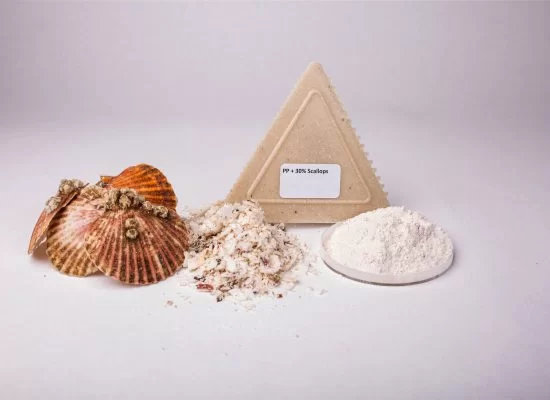NaturePlast-Biopolynov went in 2017 through a major evolution of its activity on 3 main points:
– New investors integration
– 1st industrial extruder line acquisition
– Expansion of the biocomposites derived from by-products range developed by the company
INTEGRATION OF THE COOPERATIVE AGRIAL IN OUR CAPITAL
AGRIAL is a 14 000 members farmers agricultural cooperative which transforms and commercializes their productions in 4 activity fields: milk, fruits and vegetables, beverages and meats. Originally from Normandy, Agrial has grown steadily since its creation to become one of the three French agricultural cooperative group with a presence in Europe, Africa and the United States.
So as to expand and to create activity synergies, Agrial has joined NaturePlast investors at the end of 2017. One of Agrial’s main goal is to work with NaturePlast on its waste and by-products recovery leaning to the production of new biobased and/or biodegradable plastics materials.
As part of a local development promoting circular economy, the goal is next to create products or packaging that can be integrating in several businesses of the group, from agricultural activities (mulching film, plant pots, plant clips, etc) to alimentary products commercialized (bags, trays, bottles, caps, etc).
For 2 years, NaturePlast has worked in partnership with Agrial on the manufacture of biocomposites integrating bioplastics and by-product or waste from the group (cereals, fruits, vegetables, etc). This work is driven by the COPROPLAST project, funded by the Normandy region and FEDER funds in order to develop new bioplastics materials for Agrial’s needs and on a broader level, the plastic industry.
Agrial’s force and the end of the R&D work on their by-products recovery will allow NaturePlast to lead, at short term, more ambitious industrial projects and to support the bioplastics market evolution and the regulation in Europe and France (ban of some plastic bags in 2017, ban of single use products like cotton buds or ban of disposable cutlery in 2020, etc).

1ST INDUSTRIAL EXTRUDER LINE ACQUISITION
The evolution of NaturePlast activity for more than 10 years, has been a chance to increase the bioplastics processing and characterization equipments in 2017. In addition to the twin-screw extruder used for the formulation development in Biopolynov R&D center, NaturePlast has invested in its 1st twin-screw industrial extruder adapted to the needs of our activity and application markets.
The extruder line was designed to produce bioplastics compounds derived from raw materials and additives (in the form of pellets, powder or liquid) but also biocomposites containing fibers or by-products for which often more technicality is required for their processing. Dosage, granulation and drying systems and the possibility of screw profile adaptation were developed in collaboration with an expertise firm and equipments manufacturers.
This first industrial line will be shortly duplicated by others equipments with a bigger production capacity in respond to the market yet to come.

BY-PRODUCTS RECOVERY IN THE PLASTICS INDUSTRY
Since 2015, NaturePlast produces and commercializes a biocomposites range filled with by-products (derived from cereals, shellfishes, shells, pits, etc) and vegetal fibers (hemp, flax, wood, etc).
Most of these fillers are from the French territory, the goal being to incorporate by-products or local waste into different polymers in order to work to the promotion of circular economy and by-products recovery.
These sectors have been selected for their industrial viability, in terms of volumes and quality (reproducibility of batches) and their environmental relevance. These by-products come mostly from the food industries, like shellfishes, algae, fruits and vegetables, etc and from the agricultural world like vegetal fibers (wood, flax, hemp, miscanthus, reed, bamboo) and derived from cereals (wheat, corn, etc).
Innovative biocomposites resulting from this work have also an environmental benefit thanks to the waste and by-products recovery in new bioplastics materials. They can for example, be reused by the by-products supplier: generate waste could be useful to produce a product or a packaging usable by the company (ex: use of hemp’s by-products to manufacture fence posts).
Thanks to these biocomposites, atypical design can be made which wouldn’t have been possible by simple coloration. This differentiation for industrials and consumers is immediate to the view of the develop product. This is not the case with most of the bioplastics raw materials which aspect is quite similar to the conventional polymers.
The available products list is non-exhaustive, new by-products sectors can be identified and validated according to the need.

